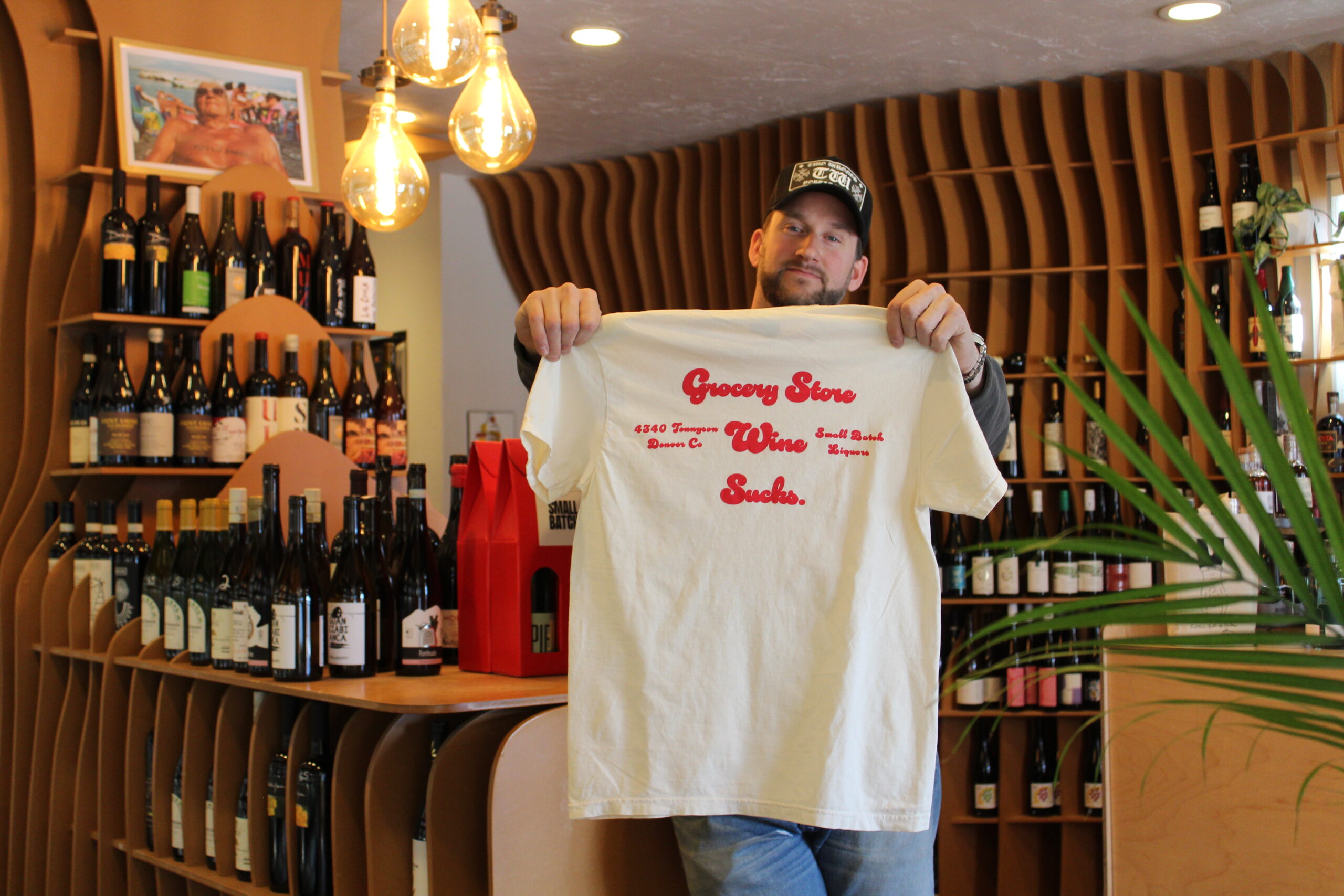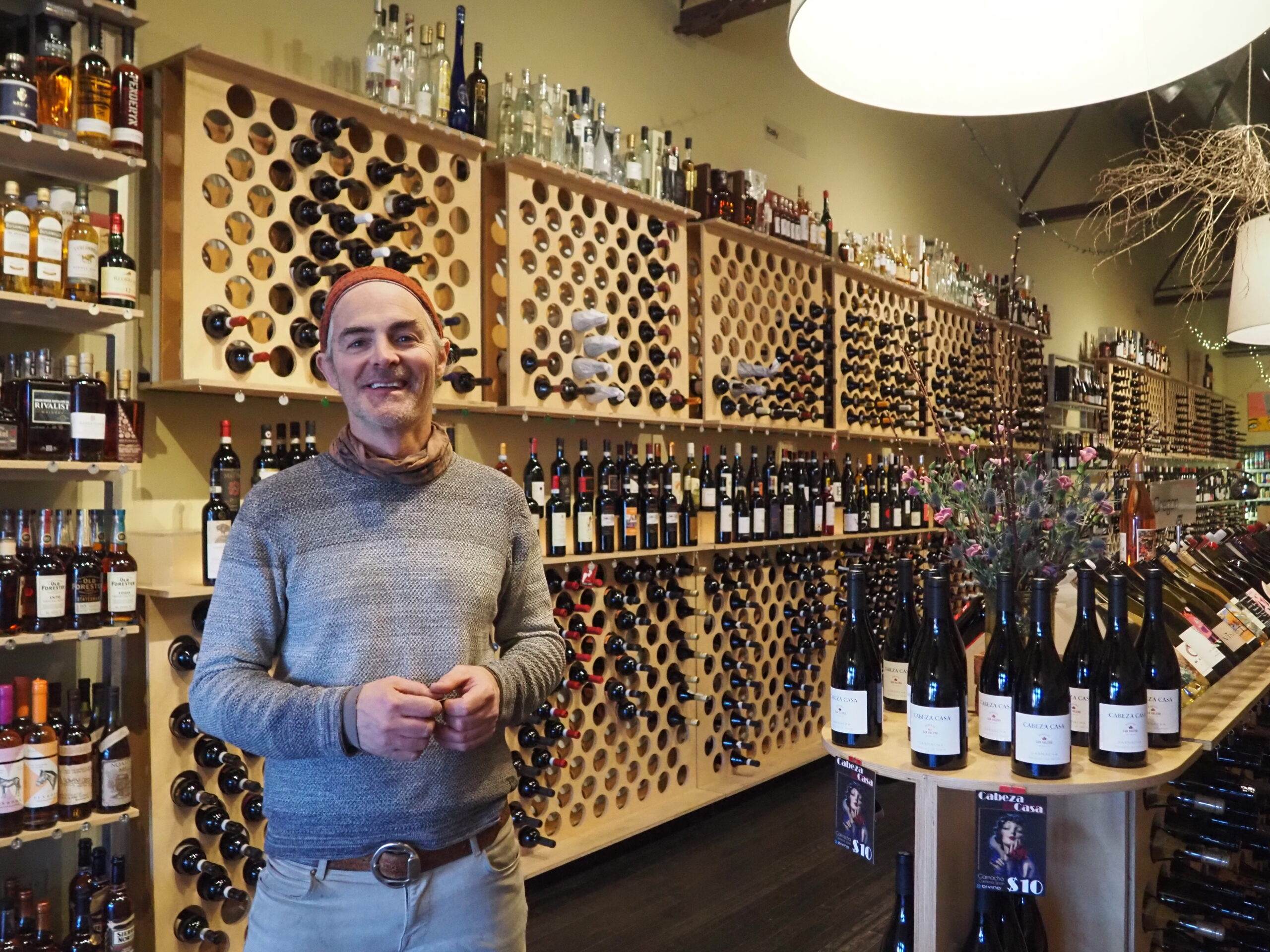
Trevor Gilham, owner of Small Batch Liquors in Berkeley, displays a “Grocery Store Wine Sucks” shirt. Still, he acknowledges, “The convenience factor is amazing – there’s no arguing with that.” (Maia Luem/BusinessDen)
One year ago this month, Colorado’s Proposition 125 went into effect, allowing grocery stores across the state to sell wine.
Local wine and liquor stores said the impacts were immediate, as customers shifted their spending elsewhere.
Clif Louis, owner of Cherry Creek’s The Vineyard Wine Shop, said his sales over the last year are down 36 percent compared to before the change.
Josh Robinson, president of Argonaut Wine & Liquor in Cap Hill, said the store’s sales were down 15 percent the month the change went into effect, and are now down about 18 percent.
“When you make what was a very large change like this, the ripple effects are huge,” Robinson said.
The proposition passed narrowly, with 51.7 percent of voters supporting it statewide. It was the second major change to alcohol sales at grocery stores in five years; stores weren’t able to sell full-strength beer until 2019.
Chris Howes, president of Colorado Retail Council, which advocates on behalf of retailers on legislative matters and supported Proposition 125, said the measure simply opened up the market.
“We brought choice to the state and I think people are enjoying it,” Howes said. “Now Colorado is very much in line with how you buy wine in other parts of the country. No longer an anomaly, no longer some antiquated system and the truth is customers love it.”
Louis bought The Vineyard in Cherry Creek in 1971 after working for a year for the shop’s founder, Robbie Wilson. The shop specializes in wine. His staff of seven are studying to be sommeliers and “masters of wine,” and have tasted nearly everything they sell.

Clif Louis (Courtesy of The Vineyard)
“I want (customers) to get excited about a bottle of wine that they’re going to drink, know a little about it, have some history and what it tastes like,” Louis said. “And the odds of leaving here with a bottle of wine that you’re probably going to like is very, very good.”
Louis said wine in grocery stores is the biggest business challenge the shop has ever faced. Sales immediately dropped 20 percent upon the law taking effect, he said, and continued to fall.
“It was an immediate change, absolutely immediate,” Louis said. “This is exactly what I was worried about, and it’s just been kind of snowballing.”
The Vineyard sells a small selection of local spirits and craft beer, and Louis said he’s considering adding more spirits, which grocery stores generally aren’t able to sell. But he said he doesn’t want to become a liquor store.
“I’m kind of old-fashioned, I want to continue to be what we are,” he said. “I don’t want to be a grocery store where you just go in and grab your bottle of wine.”
Up north in Cap Hill, Argonaut — one of the city’s larger liquor stores — sells plenty of spirits, but Robinson said wine is where the 60-year-old business made most of its money. He said Argonaut has lost about a third of its wine business.
“To lose that, it hurts,” Robinson said. “We’ve had to adjust everything.”
Robinson said Argonaut has cut staff, slimmed down its offerings and decreased the amount it spends on charities, sponsorships and advertising. But he noted his shop still has a differentiator, because independent stores offer products from small vineyards, distillers and breweries that larger chains won’t take a risk on.
“We’re still super proud of that, and love doing that,” Robinson said. “People don’t realize a part of the reason we have such an amazing craft-brewing and craft-distilling industry is because there’s so many local stores that can take chances on local brands.”

“I’m going to continue to offer people things that they’ve never seen, can’t get anywhere else,” Divino Wine & Spirits owner Dave Moore says. (Maia Luem/BusinessDen)
Dave Moore of Divino Wine & Spirits in Platt Park said the same for his 20-year-old shop.

Bruce Gallagher of Bonnie Brae Liquor (Maia Luem/BusinessDen)
“Our M.O. has always been absolutely different then grocery store products,” Moore said. “I’m going to continue to offer people things that they’ve never seen, can’t get anywhere else. It’s what we’ve been doing since day one. Seeking everything out, tasting everything, trying to find new things, exciting things, keeping it interesting and being able to talk to our customers about it.”
At Bonnie Brae Liquor, owner Bruce Gallagher said while he hasn’t laid off any employees, he’s had 10 leave that he hasn’t replaced. His sales have been down anywhere between 15 and 30 percent every month.
“We’re losing small businesses and employees day after day,” Gallagher said.
Trevor Gilham at Small Batch Liquors in Berkeley said 90 percent of his wines can’t be found in grocery stores, and “there’s a face, a family, a person behind every one of these bottles. That’s why small shops are great,” he said. “We’re able to tell these stories.”
Still, Gilham said, sales are down about 15 percent.
“The convenience factor is amazing – there’s no arguing with that,” he said.
Gilham thinks that easing some liquor laws, like the process for liquor stores to hold tastings, could help the small stores stay in business. And he said he’s worried about the long-term effects on craft alcohol producers.
“It’ll be a quick blink and you’ll wonder what happened to all the craft breweries and distilleries,” he said. “It’s not unrealistic that it will get whittled down. It all trickles back down. It’s dominoes.”
Argonaut’s Robinson said the same. And if liquor in grocery stores becomes widely available, he doesn’t have much hope for the local liquor industry.
“If that happens, it’s game over for independents,” Robinson said. “There’s nothing we can stand on.”
Howes, of the Colorado Retail Council, said it’s true that people still go to wine shops for more options and the expertise that’s offered there. And as producers, he noted that Colorado has been and still is the “genesis” of small businesses.
“Our motto or talking point has always been, ‘Let everybody compete,’” Howes said. “Why on earth would you want to constrain a free market?”

Trevor Gilham, owner of Small Batch Liquors in Berkeley, displays a “Grocery Store Wine Sucks” shirt. Still, he acknowledges, “The convenience factor is amazing – there’s no arguing with that.” (Maia Luem/BusinessDen)
One year ago this month, Colorado’s Proposition 125 went into effect, allowing grocery stores across the state to sell wine.
Local wine and liquor stores said the impacts were immediate, as customers shifted their spending elsewhere.
Clif Louis, owner of Cherry Creek’s The Vineyard Wine Shop, said his sales over the last year are down 36 percent compared to before the change.
Josh Robinson, president of Argonaut Wine & Liquor in Cap Hill, said the store’s sales were down 15 percent the month the change went into effect, and are now down about 18 percent.
“When you make what was a very large change like this, the ripple effects are huge,” Robinson said.
The proposition passed narrowly, with 51.7 percent of voters supporting it statewide. It was the second major change to alcohol sales at grocery stores in five years; stores weren’t able to sell full-strength beer until 2019.
Chris Howes, president of Colorado Retail Council, which advocates on behalf of retailers on legislative matters and supported Proposition 125, said the measure simply opened up the market.
“We brought choice to the state and I think people are enjoying it,” Howes said. “Now Colorado is very much in line with how you buy wine in other parts of the country. No longer an anomaly, no longer some antiquated system and the truth is customers love it.”
Louis bought The Vineyard in Cherry Creek in 1971 after working for a year for the shop’s founder, Robbie Wilson. The shop specializes in wine. His staff of seven are studying to be sommeliers and “masters of wine,” and have tasted nearly everything they sell.

Clif Louis (Courtesy of The Vineyard)
“I want (customers) to get excited about a bottle of wine that they’re going to drink, know a little about it, have some history and what it tastes like,” Louis said. “And the odds of leaving here with a bottle of wine that you’re probably going to like is very, very good.”
Louis said wine in grocery stores is the biggest business challenge the shop has ever faced. Sales immediately dropped 20 percent upon the law taking effect, he said, and continued to fall.
“It was an immediate change, absolutely immediate,” Louis said. “This is exactly what I was worried about, and it’s just been kind of snowballing.”
The Vineyard sells a small selection of local spirits and craft beer, and Louis said he’s considering adding more spirits, which grocery stores generally aren’t able to sell. But he said he doesn’t want to become a liquor store.
“I’m kind of old-fashioned, I want to continue to be what we are,” he said. “I don’t want to be a grocery store where you just go in and grab your bottle of wine.”
Up north in Cap Hill, Argonaut — one of the city’s larger liquor stores — sells plenty of spirits, but Robinson said wine is where the 60-year-old business made most of its money. He said Argonaut has lost about a third of its wine business.
“To lose that, it hurts,” Robinson said. “We’ve had to adjust everything.”
Robinson said Argonaut has cut staff, slimmed down its offerings and decreased the amount it spends on charities, sponsorships and advertising. But he noted his shop still has a differentiator, because independent stores offer products from small vineyards, distillers and breweries that larger chains won’t take a risk on.
“We’re still super proud of that, and love doing that,” Robinson said. “People don’t realize a part of the reason we have such an amazing craft-brewing and craft-distilling industry is because there’s so many local stores that can take chances on local brands.”

“I’m going to continue to offer people things that they’ve never seen, can’t get anywhere else,” Divino Wine & Spirits owner Dave Moore says. (Maia Luem/BusinessDen)
Dave Moore of Divino Wine & Spirits in Platt Park said the same for his 20-year-old shop.

Bruce Gallagher of Bonnie Brae Liquor (Maia Luem/BusinessDen)
“Our M.O. has always been absolutely different then grocery store products,” Moore said. “I’m going to continue to offer people things that they’ve never seen, can’t get anywhere else. It’s what we’ve been doing since day one. Seeking everything out, tasting everything, trying to find new things, exciting things, keeping it interesting and being able to talk to our customers about it.”
At Bonnie Brae Liquor, owner Bruce Gallagher said while he hasn’t laid off any employees, he’s had 10 leave that he hasn’t replaced. His sales have been down anywhere between 15 and 30 percent every month.
“We’re losing small businesses and employees day after day,” Gallagher said.
Trevor Gilham at Small Batch Liquors in Berkeley said 90 percent of his wines can’t be found in grocery stores, and “there’s a face, a family, a person behind every one of these bottles. That’s why small shops are great,” he said. “We’re able to tell these stories.”
Still, Gilham said, sales are down about 15 percent.
“The convenience factor is amazing – there’s no arguing with that,” he said.
Gilham thinks that easing some liquor laws, like the process for liquor stores to hold tastings, could help the small stores stay in business. And he said he’s worried about the long-term effects on craft alcohol producers.
“It’ll be a quick blink and you’ll wonder what happened to all the craft breweries and distilleries,” he said. “It’s not unrealistic that it will get whittled down. It all trickles back down. It’s dominoes.”
Argonaut’s Robinson said the same. And if liquor in grocery stores becomes widely available, he doesn’t have much hope for the local liquor industry.
“If that happens, it’s game over for independents,” Robinson said. “There’s nothing we can stand on.”
Howes, of the Colorado Retail Council, said it’s true that people still go to wine shops for more options and the expertise that’s offered there. And as producers, he noted that Colorado has been and still is the “genesis” of small businesses.
“Our motto or talking point has always been, ‘Let everybody compete,’” Howes said. “Why on earth would you want to constrain a free market?”


